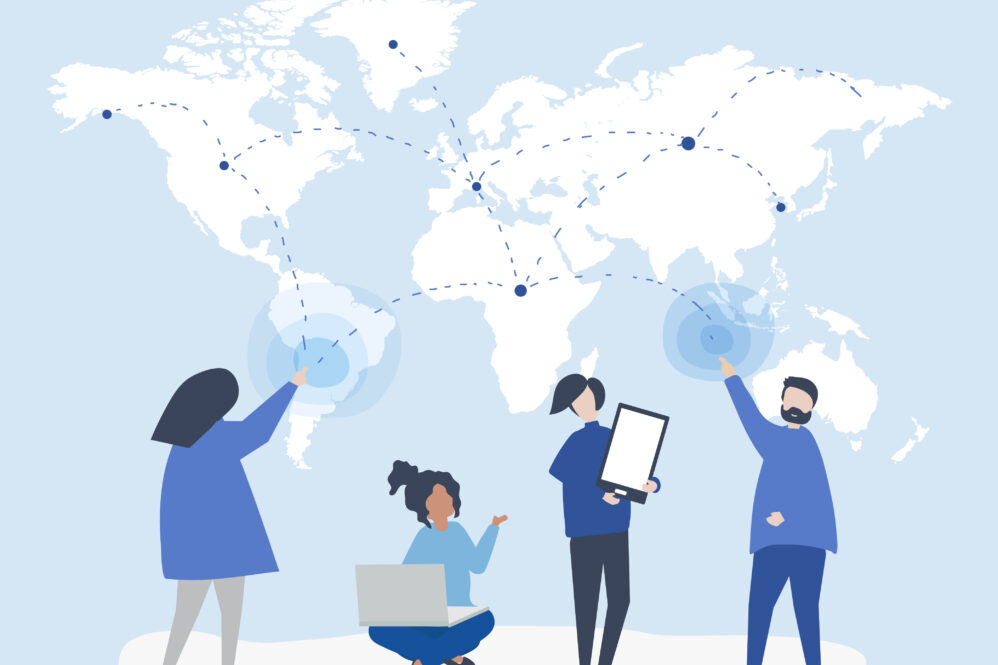The Nigerian diaspora, scattered across the globe, is a vibrant and dynamic community that has maintained deep-rooted ties with their homeland. Beyond cultural connections, this vast diaspora, consisting of millions of Nigerians living abroad, holds significant potential to contribute to the progress and prosperity of Nigeria. One area where their impact can be particularly transformative is infrastructure development.
This article delves into the essential role that the Nigerian diaspora can play in supporting infrastructure projects and partnerships aimed at bolstering the nation’s growth and development. As diaspora communities worldwide continue to expand, their remittances have already become a lifeline for many Nigerian families and have a notable impact on the country’s economy. However, their potential extends far beyond sending financial support to their loved ones back home.
Investing in infrastructure can be a game-changer for Nigeria’s socio economic landscape, propelling the nation forward and addressing critical challenges in transportation, energy, water, healthcare, education, and telecommunication sectors. By leveraging their expertise, resources, and networks, the Nigerian diaspora can significantly contribute to the realization of these projects and drive sustainable development.
The Role of the Nigerian Diaspora in Infrastructure Development
Overview of the Nigerian Diaspora and Its Size:
The Nigerian diaspora represents a significant and diverse community of Nigerians living abroad. It includes individuals and families who have migrated to various countries for reasons such as education, employment, or seeking better opportunities. According to estimates, the Nigerian diaspora is one of the largest in Africa, with millions of Nigerians living in countries across the globe. Countries with significant Nigerian communities include the United States, the United Kingdom, Canada, and various countries in Europe, Asia, and Africa.
Historical and Cultural Ties with Nigeria:
The diaspora’s connection with Nigeria extends beyond geographical boundaries. Many Nigerians living abroad maintain strong ties with their homeland, preserving their cultural heritage and traditions. This cultural connection fosters a sense of identity and belonging, leading to a keen interest in the development and progress of Nigeria.
Remittances and Their Impact on the Nigerian Economy:
Remittances from the Nigerian diaspora play a crucial role in the country’s economy. Money sent back home by Nigerians living abroad serves as a significant source of foreign exchange and contributes to the nation’s Gross Domestic Product (GDP). These remittances are often used by families for essential expenses such as education, healthcare, and housing, thereby improving the overall quality of life for many Nigerians.
Diaspora’s Potential as a Source of Investment for Infrastructure Projects:
Beyond remittances, the Nigerian diaspora possesses substantial untapped potential to support infrastructure development in Nigeria. Many members of the diaspora have achieved success in various professional fields and possess valuable expertise, skills, and financial resources. Engaging the diaspora in infrastructure projects can lead to direct investments, technology transfers, and knowledge sharing that can accelerate the country’s development.
Examining Potential Infrastructure Projects
Transportation Infrastructure
1. Improving road networks and highways: The Nigerian diaspora can support initiatives aimed at upgrading and maintaining the country’s road infrastructure. Investments in road construction, repairs, and expansion can significantly enhance transportation efficiency and connectivity across Nigeria.
2. Upgrading public transportation systems: Diaspora engagement can contribute to the development of modern and sustainable public transportation options, such as buses, trams, and commuter trains. This can reduce congestion, lower emissions, and improve the overall commuting experience.
3. Investing in airports and seaports: The diaspora’s investments can help modernize airports and seaports, increasing their capacity and efficiency. Upgraded transportation hubs can facilitate international trade, tourism, and business activities, boosting economic growth.
Energy Infrastructure
1. Renewable energy projects (solar, wind, hydro): The Nigerian diaspora can play a crucial role in funding and supporting renewable energy initiatives. Investments in solar, wind, and hydroelectric projects can diversify the energy mix, increase energy security, and reduce dependence on fossil fuels.
2. Electricity grid expansion and modernization: Support from the diaspora can aid in expanding and upgrading the electricity grid, improving access to electricity across the country. A reliable and robust grid is essential for industrial growth and improving the quality of life for Nigerian citizens.
3. Clean energy initiatives and their benefits: Encouraging investments in clean energy solutions, such as clean cookstoves and off-grid renewable systems, can have positive effects on public health and environmental conservation.
Water and Sanitation Infrastructure
1. Access to clean water and sanitation facilities: The diaspora can contribute to projects that provide access to clean and safe drinking water for communities in need. Investment in sanitation facilities and wastewater treatment can improve public health and reduce waterborne diseases.
2. Water resource management and conservation: Supporting water resource management programs can ensure sustainable water usage and mitigate the impact of water scarcity in certain regions.
3. Wastewater treatment and recycling: Investing in wastewater treatment plants and recycling systems can contribute to reducing water pollution and conserving water resources.
Healthcare Infrastructure
1. Supporting medical facilities and equipment: The Nigerian diaspora can aid in funding and equipping medical facilities, particularly in underserved areas. Access to quality healthcare can significantly improve the well-being of Nigerian citizens.
2. Investing in healthcare training and research: Diaspora engagement can support healthcare training programs and research institutions, fostering the development of skilled medical professionals and advancements in healthcare practices.
3. Telemedicine initiatives for remote areas: The diaspora can contribute to the implementation of telemedicine services, enabling access to healthcare services in remote regions with limited medical infrastructure.
Education Infrastructure
1. Improving school facilities and resources: The Nigerian diaspora’s investments can enhance educational facilities and provide better learning environments for students.
2. Supporting educational technology and innovation: Investing in educational technology and digital learning platforms can improve educational access and quality in Nigeria.
3. Scholarships and educational programs for students in need: The diaspora can establish scholarship programs and initiatives that support students from disadvantaged backgrounds, promoting equal access to education.
Telecommunication Infrastructure
1. Expanding internet connectivity and broadband access: The diaspora can contribute to projects that expand internet connectivity and improve broadband access across Nigeria, fostering digital inclusion and economic growth.
2. Enhancing telecommunications networks: Investments in telecommunications infrastructure can enhance communication networks, enabling better connectivity and information exchange.
3. Fostering digital inclusion and innovation: Diaspora engagement can support initiatives that promote digital literacy and innovation, empowering Nigerian communities to harness the benefits of the digital age.
Opportunities for Partnerships

Collaboration with Nigerian Government
1. Public-private partnerships (PPPs): Explore the potential for forming partnerships between the Nigerian government and the diaspora to jointly fund and implement infrastructure projects. PPPs can leverage the government’s regulatory authority and the diaspora’s financial resources and expertise.
2. Investment-friendly policies and regulations: Advocate for the Nigerian government to create a conducive environment for investment, including streamlined processes, reduced bureaucracy, and attractive incentives for diaspora-led projects.
3. Overcoming bureaucratic challenges: Identify and address bureaucratic hurdles that may hinder project implementation, and work with the government to streamline administrative procedures and ensure efficient project execution.
Engaging with Local Communities
1. Understanding local needs and priorities: Conduct thorough assessments to identify infrastructure gaps and needs in specific communities. Engage with local stakeholders to understand their requirements and ensure that projects align with their interests.
2. Involving communities in decision-making: Foster community participation by including local representatives in project planning and decision-making processes. This will enhance project ownership and ensure that initiatives address the actual needs of the people.
3. Ensuring sustainability and social impact: Implement projects with a focus on social and environmental sustainability. Consider long-term maintenance plans and social impact assessments to ensure that the projects benefit the communities even after completion.
Leveraging Diaspora Networks and Associations
1. Identifying diaspora organizations and networks: Reach out to existing diaspora associations and networks to gauge their interest and capacity to support infrastructure projects. These groups can serve as valuable partners in mobilizing resources and expertise.
2. Mobilizing diaspora expertise and resources: Tap into the diverse skill sets and knowledge of the diaspora community to contribute to project planning, management, and execution. Encourage the diaspora to offer pro bono technical assistance or invest directly in projects.
3. Creating platforms for knowledge exchange: Establish communication channels and platforms that facilitate knowledge sharing between the Nigerian diaspora and stakeholders in Nigeria. These platforms can foster collaboration, build trust, and exchange best practices for successful infrastructure development.
By effectively leveraging partnerships and collaborations, the Nigerian diaspora can play a crucial role in supporting infrastructure projects that contribute to the country’s economic growth, social development, and overall progress. Such engagements can strengthen ties between the diaspora and their homeland, while also fostering a more developed and resilient Nigeria.
Conclusion
In conclusion, the Nigerian diaspora possesses the potential to make a transformative impact on the nation’s infrastructure landscape. By fostering partnerships, collaboration, and innovation, the diaspora and stakeholders can collectively work towards a brighter, more prosperous future for Nigeria. Through the combined efforts of its people, Nigeria can overcome challenges, unlock opportunities, and build a nation that thrives in the 21st century.












